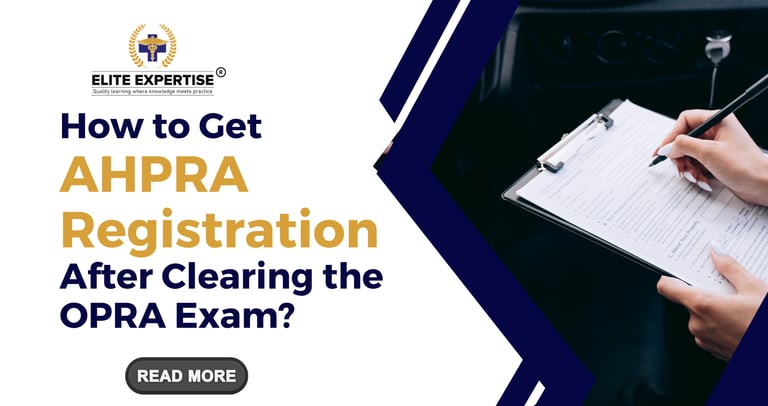ASK MY PHARMACIST | GOT QUESTIONS? Your pharmacist has answers. Click Here
How to Get AHPRA Registration After Clearing the OPRA Exam?
Passed the OPRA exam? Learn the full process to get AHPRA registration and practice as a pharmacist in Australia. Includes Elite Expertise support tips.
Sahana
5/29/20256 min read


If you are an internationally-trained pharmacist who has just cleared their OPRA (Overseas Pharmacist Readiness Assessment) exam, then congratulations! You are now one step closer to achieving your dreams of becoming a registered pharmacist in Australia.
However, it is important to note that clearing the OPRA exam is just one part of the process. To work and independently practice as a pharmacist in Australia, you need to be registered with the Australian Health Practitioner Regulation Agency (AHPRA).
As someone who might have appeared for the OPRA exam within their home country, this whole registration process might sound a bit overwhelming. After all, working in a foreign country comes with its sets of pros and cons.
However, this guide here will outline the full pathway to AHPRA registration, starting right after your OPRA success all the way to ensuring that your general registration pathway has been covered. It will also cover the role of Elite Expertise in the entire process, making sure that you understand the potential that it possesses in fast-tracking your career and opening doors to higher-level roles for you.
What is the OPRA Exam?
The OPRA exam, conducted by the Australian Pharmacy Council (APC), is an exam that has been specifically designed for overseas-trained pharmacists.
The purpose behind taking this exam is to ensure that a patient’s knowledge, skills, and competencies are comparable to those of an Australian-trained graduate. The APC wants to evaluate whether a pharmacist who has been trained in a country other than Australia could more or less adjust to or learn how to work properly in their healthcare settings.
Th exam format of the OPRA exam has been briefed as follows:
Multiple-choice questions in pharmaceutical sciences
Clinical case scenarios covering therapeutics, law, and ethics
Assessment of pharmacy practice relevant to Australia
Once a candidate has passed their OPRA exam, then they are eligible to apply for provisional registration status in accordance with AHPRA.
Apply for Provisional Registration with AHPRA
Once you have your OPRA result and a positive APC assessment, you can apply for provisional registration to begin your supervised practice in Australia.
Key Requirements:
Here are a list of documents that you might need to begin with your provisional registration process:
Certified passport and ID
Academic transcripts and degree certificates
CV/Resume outlining pharmacy experience
English test results
Certificate of Good Standing from your home country’s pharmacy council
International Criminal History Check (ICHC)
AHPRA application and registration fees
Start Supervised Practice (Internship)
With your status of provisional registration in hand, you must complete 1,571 hours of supervised practice (approximately 12 months full-time) in an approved pharmacy setting. This will add to your experience and further add ease in your registration process ahead.
Key Points:
You will be mentored by a registered Australian pharmacist
Your training must be logged using the Pharmacy Board's online system
You will gain hands-on experience in patient care, dispensing, legal compliance, and clinical decision-making.
Enroll in an Intern Training Program (ITP)
While completing your supervised practice, you must also enroll in a Pharmacy Intern Training Program, which is again, approved by the APC.
Program Covers:
This Intern Training Program typically involves 12 months of supervised practice, written assignments, and practical assessments. The purpose of this program is to equip overseas pharmacists with Australian medical standards and get them prepared for working independently within Australia with full confidence.
The course usually consists of modules about counseling patients, communicating in the clinical setting, knowledge of dispensing and awareness of local medical regulations. They also focus on understanding cultures and practicing with ethical standards.
Here is a breakdown of the subjects covered in the program:
Pharmacy law and ethics
Communication skills
Case studies and therapeutic decision-making
Clinical reasoning skills
Preparation for the intern exams
Always choose a trusted provider like PSA, Monash, or The Pharmacy Guild of Australia for the Intern Training Program (ITP).
Pass the Intern Exams
Once you have completed your designated hours of supervised practice and the ITP itself, you will then be required to take two final exams:
Intern Written Exam: This exam comprises clinical scenarios, law, ethics, and practice
Oral Examination: Real-world case discussion or structured interview.
Both exams are conducted by the Pharmacy Board of Australia, and passing them is mandatory for full registration.
Apply for General Registration
Now that you have passed all assessments and completed the internship, you can apply for general registration as a pharmacist in Australia.
As a candidate applying for general registration, you will be required to submit the following to AHPRA:
Proof of supervised practice (1,575 hours)
Intern exam results
Completion certificate of ITP
Updated criminal record checks
Updated Certificate of Good Standing (if needed)
Once approved, you’ll receive AHPRA general registration, and you can work as a fully licensed pharmacist across Australia.
How Elite Expertise Supports Your Journey as an International Pharmacist
Registering as an internationally-trained pharmacist in Australia might seem like an overwhelming and tricky job, but worry not! Elite Expertise will help you every step of the way.
Elite Expertise helps prepare internationally qualified pharmacists so that they can get licensed in countries of their choice (where they are applying for licensing exams ), such as Australia, New Zealand, Canada, or the Ireland.
This platform was created by experienced clinical pharmacists, namely Mrs. Harika Bheemavarapu and Mr. Arief Mohammad. The academy uses a mix of formal training and personalized support.
Mrs. Harika Bheemavarapu has experience in both hospital pharmacy and caring for patients directly.
Mr. Arief Mohammad helps candidates get ready for the OPRA (formerly KAPS) exams and provides personal mentoring for professional growth.
Since they have personal insight into the challenges overseas pharmacists deal with, Elite Expertise is a reliable resource for your professional path.
On the platform, you can find the following benefits:
Preparing for OPRA by using ordered and structured lectures (live and recorded), that you can easily avail from the comforts of your home
Preparing files and application materials for processes such as eligibility check and for registering with AHPRA
Mentoring by professional pharmacists who passed through the same process
Keeping up with coaching, practicing mock interviews and understanding what is most important during each step.
What makes Elite Expertise different is its commitment to good academic content as well as its thoughtful emotional support for those taking the exam.
Should you have any doubts about your papers, anxiety about your exams, or if you are generally unsure about what to do next, this platform will give you the much-needed support that you want, whenever you need it.
It is not only a preparation academy; in fact, it also supports you and guides you through your registration process so it is no longer stressful for international graduates.
Other Key Considerations
Once you are a fully registered pharmacist, there are still several responsibilities and opportunities you need to be aware of to maintain your license, stay competitive, and grow your career.
Visa Sponsorship
Some pharmacists with overseas training obtain the Skilled Independent Visa (subclass 189) or find sponsorship from employers using the Employer-Sponsored Visa (subclass 482) once they have provisional registration.
Professional Indemnity Policy
It is required by AHPRA that you always have the appropriate type of insurance while you are practicing.
Continuing Professional Development (CPD)
Pharmacists are required to get 40 CPD credits every year to hold their registration.
Conclusion
There are a number of steps you need to take after passing the OPRA exam that ensure you are registered and qualified to work independently in Australia. Although it may take time, this process helps you get ready for clinical duties in the real world and start a respected career in Australia.
Having certifications or participating in specific training programs can sharpen your skills and make you more visible to employers, both in hospitals, rural settings and leadership jobs.
You should consider consulting a registered migration agent or contacting an AHPRA advisor, though aligning with Elite Expertise is the smarter move. Thanks to Elite Expertise’s well-organized OPRA preparation, detailed mentorship and top-notch guidance from qualified experts, students find the right direction. It helps you succeed not only in your pharmacist exams, but also in your career in Australia.
This blog is for informational purposes only and represents the views and interpretations of Elite Expertise regarding career opportunities in pharmacy. While we aim to provide accurate and up-to-date insights, pharmacy licensing requirements, immigration policies, and healthcare regulations may vary by country and are subject to change.EliteExpertise does not accept responsibility for any decisions made based on the information provided in this article.
⚠️ Disclaimer


About the Author
Sahana Rao
Sahana Chinthapatla is renowned for her expertise in scientific and medical writing, backed by an MPharm in Pharmacology and years of experience in research analysis and scientific writing.
As the Head Business Writer at Elite Expertise, she provides insightful and well-researched content on KAPS, OPRA, PEBC, PSI and global pharmacy pathways, guiding aspiring pharmacists in their professional journeys.
Follow On
Head Business Writer | Elite Expertise
Follow Us
+91 76750 84909
Privacy Policy | © 2025 Elite Expertise . All Rights Reserved.
ELITE EXPERTISE PTY. LTD (ABN: 15668292439) (ACN: 668292439)
Australian Statutory Education License: OPP 2025 ELITE EXPERTISE PTY. LTD
Disclaimer
Elite Expertise is an online education platform dedicated solely to providing coaching and preparation services for the OPRA, PEBC, PSI and PTE exams. We do not offer any sponsorship or migration services. All information provided on our platform is for educational purposes only and should not be interpreted as legal or immigration advice. For inquiries regarding sponsorship, visa applications, or migration services, please consult with licensed immigration professionals or relevant authorities.
Elite Expertise is a trusted and results-driven training platform specializing in preparation for international pharmacist licensing exams. Our comprehensive courses, expert instructors, and proven methodologies have helped countless pharmacy professionals achieve their goals and succeed in competitive regulatory exams. We are proud of our strong success rate and commitment to excellence.
Elite Expertise is an independent training provider. We are not affiliated with any global pharmacy regulatory authorities or official exam-conducting bodies.
Copyright © 2026 Elite Expertise. All rights reserved.
Address
Unit 1/73 Beverley St, Doncaster East VIC 3109, Australia
